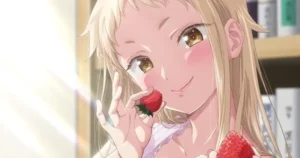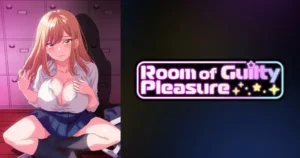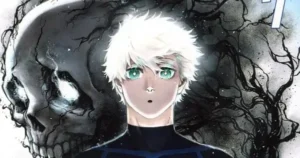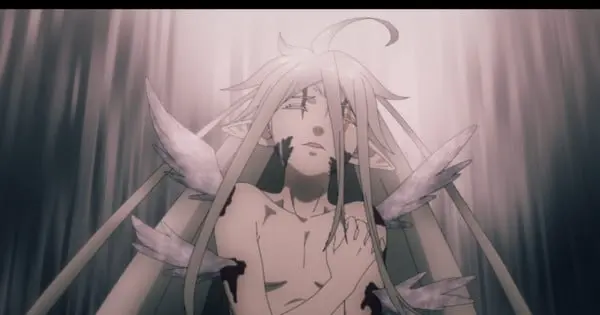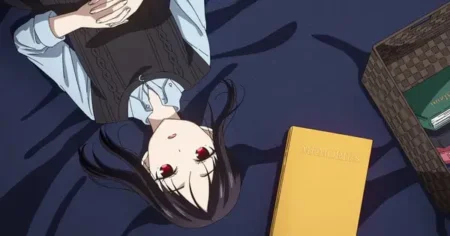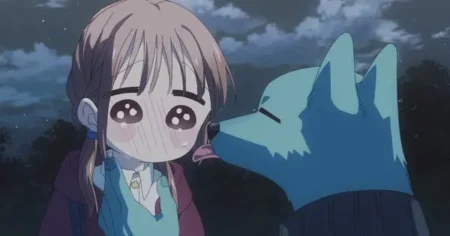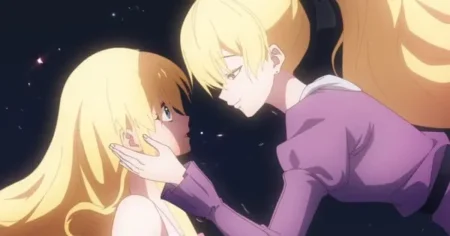Episode 7 of Übel Blatt continues the dark and violent journey of Köinzell, as he relentlessly pursues his quest for vengeance against the Seven Heroes. This episode doesn’t shy away from the series’ trademark edginess, delivering a visceral and unsettling experience for viewers.
Köinzell’s Ruthless Pursuit
The episode plunges directly into the battle between Köinzell and Landgrave Schtemwölech, one of the Seven Heroes. Schtemwölech commands an army of mind-controlled fairy girls, but they prove to be no match for Köinzell’s overwhelming power.
Köinzell dispatches the fairy girls with brutal efficiency before turning his attention to Schtemwölech himself. The Landgrave, initially arrogant, is reduced to begging for mercy as Köinzell dismembers and eviscerates him, demonstrating the protagonist’s merciless nature and the depth of his hatred.
Köinzell’s cold declaration, “That was just the first of the seven. Six more left,” underscores his unwavering commitment to his bloody mission. Viewers who are not invested in Köinzell’s revenge quest may find this episode particularly disturbing, as it highlights the extreme violence that defines Übel Blatt.
The Fall of Schtemwölech’s Castle
Following Schtemwölech’s demise, his castle begins to crumble, with lake water flooding through the cracks. The exact cause of this collapse remains ambiguous. Was it a direct consequence of Köinzell’s occult power or something else entirely? This adds a layer of mystery to the episode, hinting at the potential for deeper, more complex forces at play.
Geranpen’s End
The episode also revisits Geranpen, who is still mourning the death of Fargo. A flashback reveals the sentimental story of their first meeting, highlighting Geranpen’s unexpected heart of gold beneath his terrifying exterior. However, Geranpen’s character is often criticized for his stupidity, gullibility, and irritating campiness, making him a divisive figure among viewers.
Despite surviving multiple stabbings, Geranpen is ultimately swept away by the floodwaters and seemingly dies. His death, while perhaps intended to be poignant, may be viewed as anticlimactic and unnecessary by some.
Reunion and Regression
Exhausted from his battle and diminished by his magical expenditure, Köinzell undergoes a physical transformation, regressing to a younger, thinner version of himself resembling a fairy child. Peepi and Altea return, reuniting the main cast, albeit briefly.
Themes and Tone
Übel Blatt is a dark fantasy series that explores themes of betrayal, revenge, and the corrupting nature of power. The anime shares similarities with other dark fantasy works like Berserk and Claymore, featuring a gritty and violent world where despair and anguish are prevalent. The series incorporates elements of the supernatural, such as monsters, magic, and the occult, further enhancing its otherworldly atmosphere.
The opening theme, “Zainin (Sinner)” by GARNiDELiA, reflects the revenge-driven nature of the story.
Controversy and Censorship
The Übel Blatt anime has faced criticism for its censorship of NSFW (Not Safe For Work) scenes compared to the original manga. The manga is known for its explicit violence and sexual content, and some fans feel that the anime adaptation has toned down these elements, detracting from the overall impact of the story. However, other viewers have applauded the changes, arguing that the exaggerated sexual content distracts from the main plot and downplays the action, fantasy elements, and worldbuilding.
Production
Übel Blatt is produced by Satelight and Staple Entertainment. Satelight is known for its work on anime such as Log Horizon.
Final Thoughts
Episode 7 of Übel Blatt delivers a brutal and unsettling chapter in Köinzell’s quest for revenge. The episode’s violence, combined with its ambiguous plot points and controversial characterizations, may polarize viewers. However, fans of dark fantasy and revenge stories may find Übel Blatt‘s edginess to be a compelling aspect of the series.
Übel Blatt delves into the complexities of revenge, exploring the dark path taken by Kointzell. The series presents a world where morality is blurred, and the line between hero and villain becomes increasingly indistinct. The series also examines the impact of betrayal and the psychological toll it takes on individuals.

